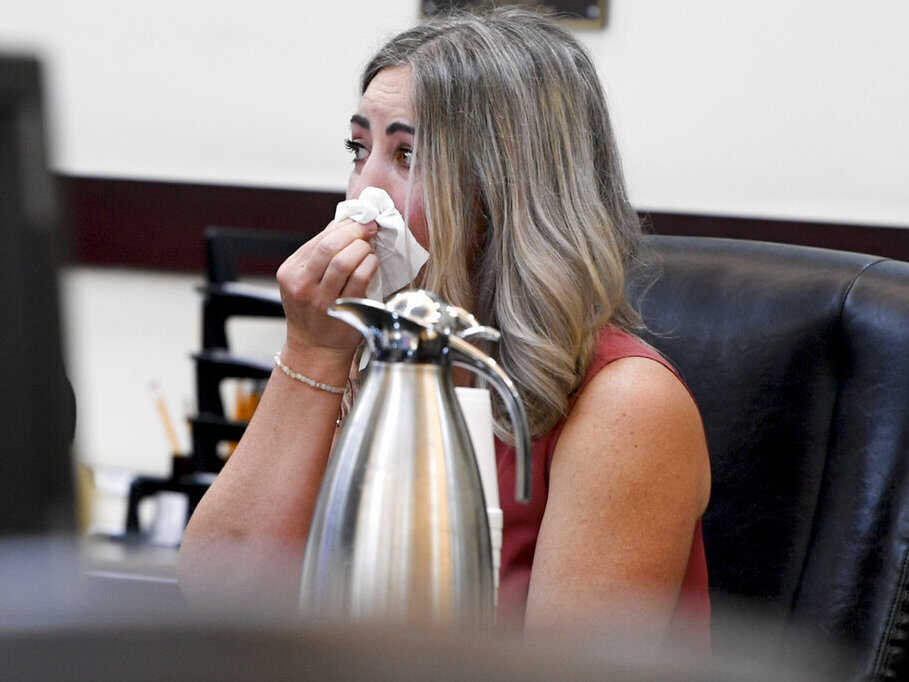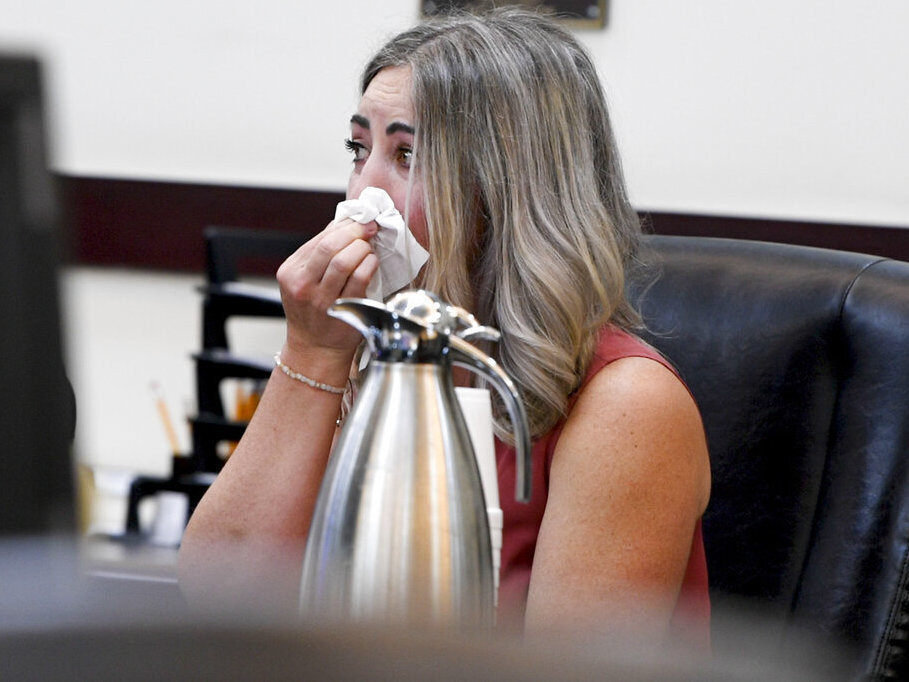Nurse sentenced to three years probation in fatal drug error : Shots

RaDonda Vaught listens to sufferer impression statements for the duration of her sentencing in Nashville. She was found responsible in March of criminally negligent murder and gross neglect of an impaired adult just after she unintentionally administered the improper medication.
Nicole Hester/AP
disguise caption
toggle caption
Nicole Hester/AP

RaDonda Vaught listens to sufferer effects statements all through her sentencing in Nashville. She was observed responsible in March of criminally negligent homicide and gross neglect of an impaired grownup after she unintentionally administered the completely wrong treatment.
Nicole Hester/AP
RaDonda Vaught, a previous Tennessee nurse convicted of two felonies for a lethal drug mistake, whose trial grew to become a rallying cry for nurses fearful of the criminalization of medical errors, will not be necessary to commit any time in jail.
Davidson County felony court docket Judge Jennifer Smith on Friday granted Vaught a judicial diversion, which suggests her conviction will be expunged if she completes a three-year probation.
Smith said the Murphey relatives experienced a “horrible reduction” and “nothing at all that comes about in this article nowadays can relieve that reduction.”
“Miss out on Vaught is very well aware of the seriousness of the offense,” Smith claimed. “She credibly expressed regret in this courtroom.”
The choose observed that Vaught experienced no felony document, has been taken out from the wellness treatment location, and will hardly ever exercise nursing once again. The choose also explained, “This was a awful, awful miscalculation and there have been effects to the defendant.”
As the sentence was examine, cheers erupted from a group of hundreds of purple-clad protesters who gathered outside the house the courthouse in opposition to Vaught’s prosecution.
Vaught, 38, a former nurse at Vanderbilt University Health-related Middle in Nashville, confronted up to 8 years in jail. In March she was convicted of criminally negligent homicide and gross neglect of an impaired grownup for the 2017 dying of 75-12 months-outdated affected person Charlene Murphey. Murphey was recommended Versed, a sedative, but Vaught inadvertently gave her a deadly dose of vecuronium, a effective paralyzer.
Charlene Murphey’s son, Michael Murphey, testified at Friday’s sentencing listening to that his family continues to be devastated by the unexpected dying of their matriarch. She was “a extremely forgiving man or woman” who would not want Vaught to provide any jail time, he explained, but his widower father required Murphey to receive “the most sentence.”
“My father suffers every day from this,” Michael Murphey stated. “He goes out to the graveyard 3 to 4 occasions a week and just sits out there and cries.”
Vaught’s case stands out for the reason that clinical problems ― even lethal types ― are generally within just the purview of condition medical boards and lawsuits are almost under no circumstances prosecuted in felony court.
The Davidson County district attorney’s business office, which did not advocate for any individual sentence or oppose probation, has described Vaught’s scenario as an indictment of a single careless nurse, not the whole nursing profession. Prosecutors argued in trial that Vaught overlooked multiple warning signs when she grabbed the mistaken drug, which includes failing to see Versed is a liquid and vecuronium is a powder.
Vaught admitted her error immediately after the combine-up was learned, and her protection largely concentrated on arguments that an truthful oversight should not represent a crime.
In the course of the listening to on Friday, Vaught explained she was eternally improved by Murphey’s dying and was “open up and honest” about her mistake in an work to avert foreseeable future errors by other nurses. Vaught also said there was no public interest in sentencing her to jail because she could not perhaps re-offend just after her nursing license was revoked.
“I have shed much more than just my nursing license and my career. I will under no circumstances be the identical man or woman,” Vaught said, her voice quivering as she commenced to cry. “When Ms. Murphey died, a part of me died with her.”
At one level in the course of her assertion, Vaught turned to deal with Murphey’s family members, apologizing for both the fatal error and how the public marketing campaign from her prosecution may possibly have forced the spouse and children to relive their loss.
“You do not ought to have this,” Vaught explained. “I hope it does not appear throughout as persons forgetting your beloved a person. … I believe we are just in the center of systems that never recognize one particular yet another.”
Prosecutors also argued at trial that Vaught circumvented safeguards by switching the hospital’s computerized treatment cupboard into “override” method, which designed it doable to withdraw drugs not prescribed to Murphey, which include vecuronium. Other nurses and nursing industry experts have advised KHN that overrides are routinely applied in lots of hospitals to obtain medicine promptly.
Theresa Collins, a journey nurse from Ga who carefully followed the demo, said she will no more time use the attribute, even if it delays patients’ care, after prosecutors argued it proved Vaught’s recklessness.
“I’m not going to override anything at all outside of standard saline. I just don’t come to feel snug carrying out it any more,” Collins stated. “When you criminalize what health and fitness care staff do, it alterations the entire ballgame.”

Danielle Threet, still left, a nurse and mate of RaDonda Vaught, stands subsequent to her mother, Alex Threet, at a rally in assist of Vaught outside the Davidson County Courthouse in Nashville forward of sentencing.
Brett Kelman/Kaiser Wellness Information
disguise caption
toggle caption
Brett Kelman/Kaiser Well being News

Danielle Threet, still left, a nurse and buddy of RaDonda Vaught, stands subsequent to her mother, Alex Threet, at a rally in guidance of Vaught outdoors the Davidson County Courthouse in Nashville forward of sentencing.
Brett Kelman/Kaiser Wellness News
Vaught’s prosecution drew condemnation from nursing and clinical organizations that stated the case’s hazardous precedent would worsen the nursing shortage and make nurses considerably less forthcoming about issues.
The situation also spurred considerable backlash on social media as nurses streamed the trial via Fb and rallied driving Vaught on TikTok. That outrage motivated Friday’s protest in Nashville, which drew supporters from as far as Massachusetts, Wisconsin and Nevada.
Amid individuals protesters was David Peterson, a nurse who marched Thursday in Washington, D.C., to demand health care reforms and safer nurse-affected person staffing ratios, then drove by means of the evening to Nashville and slept in his automobile so he could protest Vaught’s sentencing. The functions were inherently intertwined, he claimed.
“The issues staying protested in Washington, techniques in put for the reason that of poor staffing in hospitals, that’s particularly what occurred to RaDonda. And it puts every single nurse at danger every single working day,” Peterson mentioned. “It’s cause and result.”
Tina Vinsant, a Knoxville nurse and podcaster who arranged the Nashville protest, said the group experienced spoken with Tennessee lawmakers about laws to guard nurses from felony prosecution for clinical mistakes and would pursue related costs “in each and every point out.”
Vinsant said they would pursue this campaign even while Vaught was not sent to prison.
“She should not have been charged in the initial area,” Vinsant reported. “I want her not to provide jail time, of study course, but the sentence isn’t going to truly have an effect on where we go from right here.”
Janis Peterson, a not long ago retired ICU nurse from Massachusetts, stated she attended the protest immediately after recognizing in Vaught’s circumstance the all-also-familiar difficulties from her own nursing profession. Peterson’s fear was a popular chorus amongst nurses: “It could have been me.”
“And if it was me, and I seemed out that window and saw 1,000 persons who supported me, I’d really feel improved,” she said. “Mainly because for each one particular of those people 1,000, there are most likely 10 far more who guidance her but could not occur.”
Nashville Community Radio’s Blake Farmer contributed to this report.
KHN (Kaiser Wellness News) is a nationwide newsroom that provides in-depth journalism about overall health problems. It is an editorially impartial working program of KFF (Kaiser Family members Basis).

